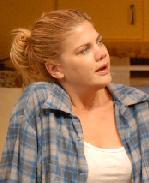SITE GUIDE
SEARCH
REVIEWS
REVIEW ARCHIVES
ADVERTISING AT CURTAINUP
FEATURES
NEWS
Etcetera and
Short Term Listings
LISTINGS
Broadway
Off-Broadway
NYC Restaurants
BOOKS and CDs
OTHER PLACES
Berkshires
London
California
New Jersey
DC
Philadelphia
Elsewhere
QUOTES
TKTS
PLAYWRIGHTS' ALBUMS
LETTERS TO EDITOR
FILM
LINKS
MISCELLANEOUS
Free Updates
Masthead
Writing for Us
A CurtainUp Review
Scarcity
By Elyse Sommer
|
You worry too much about me and Dad.— Martha Somebody has to worry— 12-year-old Rachel. |

Jesse Eisenberg in Scarcity
(Photo: Doug Hamilton)
|
As in Where We Were Born, Thurber draws a disturbing yet compelling picture of contemporary life in the lower depths. The setting is a Western Massachussetts hill town where the divide between the well-to-do, well-educated upper classes and those mired in go-nowhere poverty is enormous.

Kristen Johnston in Scarcity
(Photo: Doug Hamilton)
|
Though smarter and more responsible than the boozy Herb, Martha is nevertheless uneducated and uncouth and still hooked on rough and tumble sex with him. The real adults in this family are the children, sixteen-year-old Billy and twelve-year-old Rachel. Both are bright enough for a future different that would rescue them from their miserable home lives. Billy already has one foot out the door of the ramshackle house through his enrollment in a gifted student program in one of the area's upscale schools, and he's promised to help his super smart, eerily insightful sister follow him into a better life. Unfortunately Billy is too intense and is having a diffiult time juggling his new school situation with life in his dysfunctional environment. When Miss Roberts (Maggie Kiley), a young teacher from a privileged background takes an interest in him, he looks to her as a means for making a complete break through a scholarship at a private boarding school.
Teachers as rescuers of talented but poor students have been standard fictional fare. A revival of Emlyn Williams' The Corn is Green proved to be a major hit at this past summer's Williamstown Theater Festival. But Miss Roberts is no Miss Moffat and this aspect of the play has a somewhat manufactured ring to it. At any rate, Thurber's play is too raw for a conventional Corn Is Green style happy ending. Pride can't change parental habits, and the play's single most sympathetic and if Billy makes his escape, it's likely that the play's smartest character, the wise beyond her years Rachel, will end up suffering for it.
As directed by Jackson Gay, and with the help of a fine creative team, the story plays out with affecting grittiness and the talented cast brings out the darker emotions and the spurts of black humor. Kristen Johnston's Martha reveals the wasted potential and residue of hope in this still beautiful woman for whom Billy represents an accomplishment of sorts. Michael T. Weiss's never quite sober Herb hints at the turn for evil some of his inappropriate comments to his young daughter might take. Todd Weeks and Miriam Shor as cousin Louie and his much put upon wife Gloria add big dose of daffyness and frustration to the mix.
Jesse Eisenberg makes Billy's struggle to straddle the world he lives in and the world to which he aspires palpable. There's one scene where he blows up at the schoolteacher who's in her own way as needy as he is (well played by Maggie Kiley) that illustrates Thurber at her most devastating. Even though she needs some work on her voice projection, Meredith Brandt makes a touching off-Broadway debut as the desperate little girl who is forced to be her parents' keeper as well as her brother's savior.
Thurber is an unflinching observer of the life style of an all too large underclass in a society that has always defined itself as classless. Except for young Rachel, the people she depicts are not likeable, but neither are they easily forgettable.
LINKS TO OTHER PLAYS BY LUCY THURBER
Killers and Other Family -2001
Stay - Spring 2007
Where We're Born- 2003
s.
|
SCARCITY By Lucy Thurber' Directed by Jackson Gay. Cast: Kristen Johnston (Martha), Maggie Kiley (Ellen), Todd Weeks (Louie),, Meredith Brandt (Rachel), Jesse Eisenberg (Billy), Miriam Shor (Gloria), Michael T. Weiss (Herb). Scenic design: Walt Spangler Costume design : Ilona Somogyi Lighting design: Jason Lyons Sound design: Daniel Baker Atlantic Theater Company 336 W. 20th Street. www.atlantictheater.org From 8/29/07 to 10/14/07--extending to 10/21/07; opening 9/20/07. Tuesday through Friday at 8 PM, Saturday at 2 PM & 8 PM and Sundays at 3 PM. Running Time: 1 hour and 50 minutes with 1 intermission Reviewed by Elyse Sommer at September 14th press preview. |
Wicked
Jersey Boys
The Little Mermaid
Lion King
Shrek The Musical

The Playbill Broadway YearBook

Leonard Maltin's 2007 Movie Guide
Leonard Maltin's 2005 Movie Guide

 >
>

